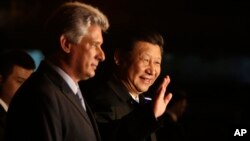Chinese President Xi Jinping begins a two-day visit to Cuba on Monday evening, stirring hopes on the island that China will finally invest in the country after a number of important deals never materialized.
Xi is to meet with President Raul Castro on Tuesday and then fly to Santiago de Cuba to see plans to improve port facilities and recovery efforts from Hurricane Sandy, which devastated Cuba's second city almost two years ago.
Xi was in Brazil last week for a summit of the BRICS nations, which also includes Russia, India and South Africa. He then traveled to Argentina and Venezuela, signing several multi-billion-dollar credit and investment agreements, before stopping in Cuba on his way home.
Communist-run China and Cuba are close political allies.
Generous trade credits have made China the island's largest creditor and second biggest trade partner after Venezuela at $1.4 billion last year.
China has rescheduled Cuba's government and commercial debt, believed to top $6 billion. But large investment agreements for the nickel industry, signed in 2000, another in hotels, and a deal to expand an oil refinery agreed five years ago, have not materialized.
Chinese-made cars, buses, locomotives, ships and household appliances are increasingly prevalent in Cuba. China's flag flies from leased oil rigs along the northwest coast and a modern container port boasts Chinese equipment, but direct investments are limited to a communications venture established 15 years ago and an onshore oil block in Pinar del Rio province.
Chinese diplomats and businessmen have told Reuters over the years that they had little confidence in Cuba's ability to work efficiently with them, complained about the high cost of doing business, and said Cuba has balked at bringing construction crews in from China to build projects.
Little of the $80 billion China has invested in Latin America and the Caribbean in recent years has been in Cuba.
That, along with a review of debt and trade, will top this week's agenda.
Raul Castro began instituting market-oriented reforms after taking over from ailing brother Fidel Castro in 2006, much as China did in the 1980s.
This year, Cuba established its first Chinese-style special development zone and passed a more attractive foreign investment law with a particular eye to friendly nations such as Russia, China and Brazil. It includes a clause aimed at China that for the first time would allow investors to bring in their nationals for construction.
Talks are reportedly underway for a number of investment projects, including in pharmaceuticals and automotive assembly, but no final investment agreements are expected this week.
"The Chinese are not satisfied with the pace and depth of reforms in Cuba," said Christopher Sabatini, senior director of policy at the Americas Society and Council of the Americas.
"This is ultimately a pragmatic government and it's not about to invest in Cuba for ideological reasons or even for geopolitical, long-term reasons if there isn't a profit or resource to be gained immediately," he said.





